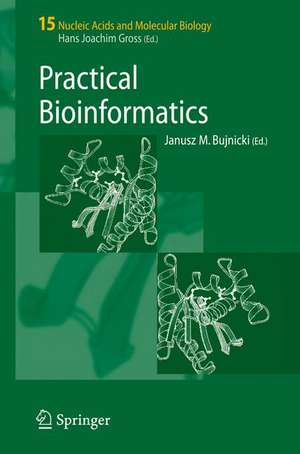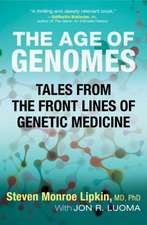Practical Bioinformatics: Nucleic Acids and Molecular Biology, cartea 15
Editat de Janusz M. Bujnickien Limba Engleză Paperback – 2 oct 2007
| Toate formatele și edițiile | Preț | Express |
|---|---|---|
| Paperback (1) | 990.62 lei 6-8 săpt. | |
| Springer Berlin, Heidelberg – 2 oct 2007 | 990.62 lei 6-8 săpt. | |
| Hardback (1) | 991.79 lei 6-8 săpt. | |
| Springer Berlin, Heidelberg – 3 mar 2004 | 991.79 lei 6-8 săpt. |
Din seria Nucleic Acids and Molecular Biology
- 18%
 Preț: 1111.53 lei
Preț: 1111.53 lei - 18%
 Preț: 1003.38 lei
Preț: 1003.38 lei - 15%
 Preț: 639.41 lei
Preț: 639.41 lei - 15%
 Preț: 647.08 lei
Preț: 647.08 lei - 15%
 Preț: 642.68 lei
Preț: 642.68 lei - 15%
 Preț: 642.36 lei
Preț: 642.36 lei - 18%
 Preț: 1822.76 lei
Preț: 1822.76 lei - 18%
 Preț: 1231.32 lei
Preț: 1231.32 lei - 18%
 Preț: 956.99 lei
Preț: 956.99 lei - 15%
 Preț: 637.28 lei
Preț: 637.28 lei - 5%
 Preț: 1102.31 lei
Preț: 1102.31 lei - 18%
 Preț: 1218.17 lei
Preț: 1218.17 lei - 18%
 Preț: 947.98 lei
Preț: 947.98 lei - 18%
 Preț: 1384.26 lei
Preț: 1384.26 lei - 18%
 Preț: 1227.52 lei
Preț: 1227.52 lei - 18%
 Preț: 1228.29 lei
Preț: 1228.29 lei - 18%
 Preț: 1225.79 lei
Preț: 1225.79 lei - 18%
 Preț: 942.13 lei
Preț: 942.13 lei - 18%
 Preț: 1222.62 lei
Preț: 1222.62 lei - 18%
 Preț: 950.03 lei
Preț: 950.03 lei - 18%
 Preț: 1216.02 lei
Preț: 1216.02 lei - 18%
 Preț: 953.20 lei
Preț: 953.20 lei - 18%
 Preț: 949.73 lei
Preț: 949.73 lei - 15%
 Preț: 646.30 lei
Preț: 646.30 lei - 18%
 Preț: 895.27 lei
Preț: 895.27 lei - 18%
 Preț: 1004.36 lei
Preț: 1004.36 lei - 18%
 Preț: 894.34 lei
Preț: 894.34 lei
Preț: 990.62 lei
Preț vechi: 1238.28 lei
-20% Nou
Puncte Express: 1486
Preț estimativ în valută:
189.58€ • 205.85$ • 159.25£
189.58€ • 205.85$ • 159.25£
Carte tipărită la comandă
Livrare economică 22 aprilie-06 mai
Preluare comenzi: 021 569.72.76
Specificații
ISBN-13: 9783540742678
ISBN-10: 3540742670
Pagini: 265
Ilustrații: XVII, 265 p.
Dimensiuni: 155 x 235 x 17 mm
Greutate: 0.52 kg
Ediția:1st ed. 2004. 2nd printing 2007
Editura: Springer Berlin, Heidelberg
Colecția Springer
Seria Nucleic Acids and Molecular Biology
Locul publicării:Berlin, Heidelberg, Germany
ISBN-10: 3540742670
Pagini: 265
Ilustrații: XVII, 265 p.
Dimensiuni: 155 x 235 x 17 mm
Greutate: 0.52 kg
Ediția:1st ed. 2004. 2nd printing 2007
Editura: Springer Berlin, Heidelberg
Colecția Springer
Seria Nucleic Acids and Molecular Biology
Locul publicării:Berlin, Heidelberg, Germany
Public țintă
ResearchCuprins
Computational Methods for Protein Structure Prediction and Fold Recognition.- ‘Meta’Approaches to Protein Structure Prediction.- From Molecular Modeling to Drug Design.- Structure Determination of Macromolecular Complexes by Experiment and Computation.- Modeling Protein Folding Pathways.- Structural Bioinformatics and NMR Structure Determination.- Bioinformatics-Guided Identification and Experimental Characterization of Novel RNA Methyltransferas.- Finding Missing tRNA Modification Genes: A Comparative Genomics Goldmine.- Evolution and Function of Processosome, the Complex That Assembles Ribosomes in Eukaryotes: Clues from Comparative Sequence Analysis.- Bioinformatics-Guided Experimental Characterization of Mismatch-Repair Enzymes and Their Relatives.- Predicting Functional Residues in DNA Glycosylases by Analysis of Structure and Conservation.
Textul de pe ultima copertă
The book is unique in that it bridges the gap between bioinformaticists and molecular biologists, i.e. the developers and the users of computational methods for biological data analysis and in that it presents examples of practical applications of the bioinformatics tools in the "daily practice" of an experimental research scientist.
The book starts with reviews on computational methods for protein sequence-structure-function analysis (sequence studies, structure prediction), followed by methods that explicitly utilize experimental data routinely obtained in the laboratory to improve the functional predictions. The second part comprises a series of examples on how particular applications of different types of bioinformatics methods in combination with experimental studies to validate the hypotheses have led to important scientific discoveries.
Therefore, the book is a guide to application of bioinformatics methods in molecular biology, addressed mainly to researchscientists, postdocs, and advanced graduate students.
The book starts with reviews on computational methods for protein sequence-structure-function analysis (sequence studies, structure prediction), followed by methods that explicitly utilize experimental data routinely obtained in the laboratory to improve the functional predictions. The second part comprises a series of examples on how particular applications of different types of bioinformatics methods in combination with experimental studies to validate the hypotheses have led to important scientific discoveries.
Therefore, the book is a guide to application of bioinformatics methods in molecular biology, addressed mainly to researchscientists, postdocs, and advanced graduate students.
Caracteristici
Unique feature of this book is its interdisciplinary approach: it combines computational (theoretical) and experimental approaches to solve non-trivial scientific problems First book to focus on the application of bioinformatic tools for protein sequence-structure-function analysis Includes supplementary material: sn.pub/extras
















